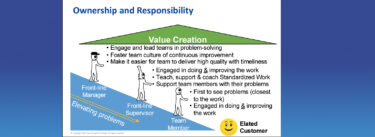I’ve just been reading that the slump in U.S. manufacturing is now deeper than the 1991-92 recession, meaning that the U.S. is now in the sad state last experienced in 1981-82. Meanwhile Japanese manufacturing, except for a few successful car companies like Toyota and Honda, is falling back into recession and European manufacturers are feeling intense distress as well.
It’s therefore not surprising that we at LEI have been getting a lot of requests recently to help companies find lean expertise for harder times. Unfortunately, we can’t do what many of you would like: find you just the right person to join your company or just the right consultant to share his or her learning curve with you. We decided at the very outset of the Institute that we would not be consultants ourselves, that we would not be headhunters, and that we would not recommend headhunters or consultants.
What we can do is to suggest simple guidelines for finding the lean “sensei” (Japanese for “teacher”) you may need.
- Start by asking whether you want to hire a senior manager to lead your lean leap as an employee or whether retaining a consultant would be better. The third approach is simply to do it yourself with the managers you have now, and our workbook series at LEI is designed to give you the tools you will need.
- If you want to hire someone, look at successful lean firms and figure out who was responsible for the transformation. (A good headhunter specializing in lean may be able to help you find good candidates.) But be careful: we’ve seen many cases of a lean firm like Toyota where managers really only need to maintain a system set up by others some time ago. Taking these “steady-state” managers — very successful in an established lean environment — and asking them to create order out of chaos in your environment may be asking for more than they can deliver. So be sure that both the lean skills and the ability to create change are equal to the job before you make an offer.
- If you want to hire a consultant, ask yourself whether you want (a) an expert in what Mike Rother and John Shook call “process kaizen” who can apply specific techniques to specific problems (like cell design or 5S or standard work) or (b) an expert in what Mike and John call “flow kaizen” who can tackle entire value streams, from a single model line to a whole company, or (c) what I call a “kaikaku” specialist (a real revolutionary) who will show you the big picture, challenge all of your assumptions about your business, and thoroughly stir things up. Possibly you can find one person who can do all three, but be sure what your priorities are or you are likely to be disappointed with the results.
- Once you are sure what you want in a consultant, check the previous work of your candidates carefully by visiting firms where they have been involved for a considerable period of time. Did they get sustainable results? And could they diffuse their knowledge within the client company? Or did they behave like classic skilled tradesmen who will solve your problem but never tell you how it was done so you will always need to call them back? (We call this latter phenomenon “consultant dependency.”)
- Once you are sure you have the right consultant or transforming manager, ask yourself how you are going to internalize their knowledge and diffuse it across your business. We continue to be amazed at how many companies think that once they retain a highly skilled consultant they can simply set the lean transformation on autopilot and wait for lean thinking to deepen and spread. By contrast, the smart company assigns some of its smartest people to follow the sensei’s every move, record the techniques and methods, and then systematically diffuse these across the entire business. (Even Toyota did this with Taiichi Ohno, who was highly resistant to writing down the principles and techniques of TPS. One of the early assignments of Fujio Cho, the current Toyota president, was to follow Ohno around and make sure everything was recorded.)
- As you systematically record what your transforming manager or sensei is doing, challenge him with more and more difficult assignments on harder and harder problems. Stated another way, never ask him to solve the same problem twice. Instead ask your sensei to solve a specific problem once, then challenge your people to solve it the second time, perhaps with a bit of sensei coaching. This is the way to get the best use of your sensei and a good sensei will respond to the challenge.
These are simple rules and we know that they work. Together they constitute a simple “process” — that magic word — for finding the help you need. We wish you luck in your holiday shopping!






